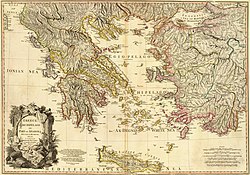
Back Antieke Griekeland Afrikaans Antikes Griechenland ALS Antiga Grecia AN اليونان القديمة Arabic اليونان القديمه ARZ প্ৰাচীন গ্ৰীচ Assamese Antigua Grecia AST НекӀсияб Грекия AV Qədim Yunanıstan Azerbaijani قدیم یونان AZB
| History of Greece |
|---|
 |
|
|
| Ancient history |
|---|
| Preceded by prehistory |
|
Ancient Greece (Ancient Greek: Ἑλλάς, romanized: Hellás) was a northeastern Mediterranean civilization, existing from the Greek Dark Ages of the 12th–9th centuries BC to the end of classical antiquity (c. 600 AD), that comprised a loose collection of culturally and linguistically related city-states and communities. Prior to the Roman period, most of these regions were officially unified only once under the Kingdom of Macedon from 338 to 323 BC.[a] In Western history, the era of classical antiquity was immediately followed by the Early Middle Ages and the Byzantine period.[1]
Ancient Greece Ἑλλάς (Hellas) | |||||||||||
|---|---|---|---|---|---|---|---|---|---|---|---|
| c. 800 BC–146 BC | |||||||||||
 | |||||||||||
| Capital |
| ||||||||||
| Religion | |||||||||||
| Historical era | Classical antiquity | ||||||||||
• Rise of Greek city-states (poleis) | c. 800 BC | ||||||||||
| c. 800 BC – c. 480 BC | |||||||||||
| c. 480 BC – c. 323 BC | |||||||||||
| 323 BC – 146 BC | |||||||||||
| 146 BC | |||||||||||
| |||||||||||
Three centuries after the decline of Mycenaean Greece during the Bronze Age collapse, Greek urban poleis began to form in the 8th century BC, ushering in the Archaic period and the colonization of the Mediterranean Basin. This was followed by the age of Classical Greece, from the Greco-Persian Wars to the death of Alexander the Great in 323 BC, and which included the Golden Age of Athens and the Peloponnesian War. The unification of Greece by Macedon under Philip II and subsequent conquest of the Achaemenid Empire by Alexander the Great spread Hellenistic civilization across the Middle East. The Hellenistic period is considered to have ended in 30 BC, when the last Hellenistic kingdom, Ptolemaic Egypt, was annexed by the Roman Republic.
Classical Greek culture, especially philosophy, had a powerful influence on ancient Rome, which carried a version of it throughout the Mediterranean and much of Europe. For this reason, Classical Greece is generally considered the cradle of Western civilization, the seminal culture from which the modern West derives many of its founding archetypes and ideas in politics, philosophy, science, and art.[2][3][4]
Cite error: There are <ref group=lower-alpha> tags or {{efn}} templates on this page, but the references will not show without a {{reflist|group=lower-alpha}} template or {{notelist}} template (see the help page).
- ^ Thomas, Carol G. (1988). Paths from ancient Greece. Brill. pp. 27–50. ISBN 978-90-04-08846-7.
- ^ Maura Ellyn; Maura McGinnis (2004). Greece: A Primary Source Cultural Guide. Rosen. p. 8. ISBN 978-0-8239-3999-2.
- ^ John E. Findling; Kimberly D. Pelle (2004). Encyclopedia of the Modern Olympic Movement. Greenwood. p. 23. ISBN 978-0-313-32278-5.
- ^ Wayne C. Thompson; Mark H. Mullin (1983). Western Europe, 1983. Stryker-Post Publications. p. 337. ISBN 978-0-943448-11-4.
for ancient Greece was the cradle of Western culture ...
© MMXXIII Rich X Search. We shall prevail. All rights reserved. Rich X Search